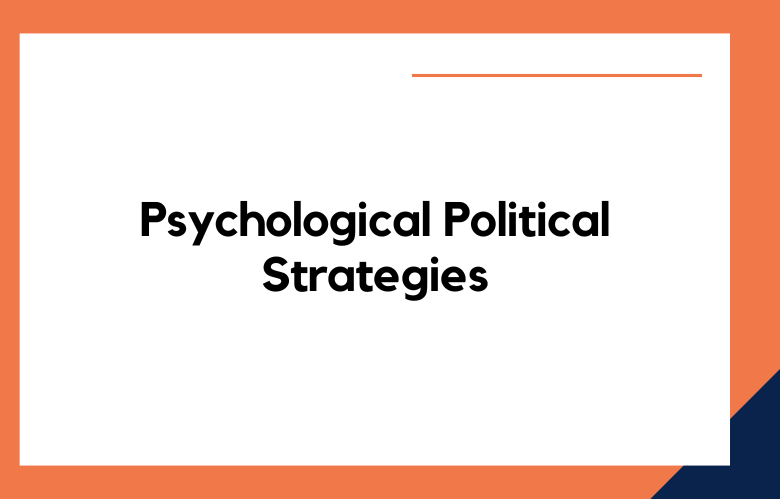Incumbency is one of the most significant obstacles a challenger can face in a political campaign. Incumbents have a clear advantage over their competitors regarding name recognition, fundraising ability, voter loyalty, and resource access. But all is not lost for a challenger.
There are psychological strategies that can help level the playing field and allow a challenger to overcome the odds and become a successful candidate. We’ll explore the top methods for defeating an incumbent and winning an election from a psychological perspective.
Unseating the Incumbent: Political Strategies for Overcoming the Advantage
Establish a Clear Message
The first step in unseating an incumbent is establishing a clear message about why you are running and what you hope to achieve. This should be focused on the issues that matter most to your constituents, such as job creation, health care access, or improving education. It is essential to differentiate yourself from the incumbent and show how your policies will benefit the people of your district.
Build Name Recognition
Name recognition is critical when it comes to unseating an incumbent. The more people know who you are and what you stand for, the more likely they will vote for you. To build name recognition, try contacting local media outlets, attending public forums and debates, and participating in community events. You can also use social media platforms like Facebook and Twitter to get your message out.
Connect with Voters
If you want to unseat an incumbent, it’s essential to connect with voters personally. Try going door-to-door in your district or setting up meetings with local groups and organizations. It would help if you also focused on building relationships with key influencers in your area, such as business owners, religious leaders, and local elected officials, who can help spread the word about your campaign.
Raise Funds
Raising money is essential for any successful political campaign, especially when challenging an incumbent who has already established name recognition and built up a war chest of funds over several terms in office. Try organizing fundraising events such as dinners or auctions or reaching out to potential donors online via crowdfunding platforms like GoFundMe or Kickstarter.
Develop a Get Out The Vote Strategy
Getting people out to vote is essential to unseat an incumbent candidate. To do this effectively, develop a comprehensive get-out-the-vote strategy that includes targeted mailings, phone banking campaigns, canvassing efforts, social media outreach initiatives, and volunteer recruitment drives to motivate voters in your district to go out and cast their ballots on election day.
Utilize Endorsements
Endorsements from influential figures can help unseat an incumbent candidate, so be sure to seek them out whenever possible during your campaign period.
Endorsements from prominent politicians or celebrities can lend credibility to your candidacy. In contrast, endorsements from respected community leaders may sway undecided voters in your favor at the polls on Election Day.
Leverage Social Media Platforms
Social media platforms like Facebook, Twitter, Instagram, YouTube, etc., provide invaluable tools for communicating with potential voters during political campaigns.
Use these platforms not only to disseminate information about yourself but also to engage directly with constituents by responding to questions or comments they post online. This will help create a connection between yourself and those living in the district, which could sway their decision come election day.
Create A Compelling Narrative
It would help if you created a compelling narrative around why you are running against the incumbent candidate, which resonates with potential voters.
Focus on highlighting differences between yourself and the current officeholder while emphasizing how electing you would ultimately benefit those living within the district. This narrative should be consistent across all of your communication efforts so that it becomes ingrained in people’s minds until Election Day.
Shifting the Narrative: Political Strategies to Undermine Incumbency Advantage
Develop a Clear Message
When challenging an incumbent, developing a clear message that resonates with voters is essential. This should be done by outlining the candidate’s vision for the future and how they plan to address current issues. This message should be communicated through multiple channels, such as social media, television ads, and public appearances.
Focus on Voter Turnout
To win an election, it is essential to focus on voter turnout. This can be done by engaging in get-out-the-vote efforts such as phone banking and canvassing in critical districts. It is also important to target different demographics of voters, such as young people and minority groups who may not typically vote in large numbers.
Leverage Social Media
Social media can be a powerful tool for challengers looking to undermine incumbency advantage. By creating a presence on platforms like Twitter and Facebook, candidates can reach potential voters directly and communicate their message more effectively than traditional advertising. Social media also allows candidates to respond quickly to events or news stories that could affect their campaign’s momentum.
Invest in Polling
Investing in polling is another way for challengers to gain an edge over incumbents during an election cycle. Polling can provide valuable insights into the electorate’s opinion on issues and allow campaigns to tailor their messages accordingly. Polling can help campaigns identify which areas are most likely to turn out for them on Election Day and which areas need additional outreach efforts from the campaign team.
Utilize Endorsements
Endorsements from influential figures or organizations can boost challengers when competing against incumbents who have already established name recognition among voters. Endorsements from local celebrities or organizations that are popular with specific demographics of voters can help generate excitement about the challenger’s candidacy and encourage more people to turn out on Election Day.
Highlight the Incumbent’s Weaknesses
Challengers should also look for ways to highlight incumbent weaknesses that could sway potential voters away from them at the polls. This could include pointing out any ethical lapses or policy decisions that have been unpopular with constituents and highlighting any broken promises made by the incumbent. Doing this will help show why the challenger would make a better choice than the incumbent regarding voting.
Emphasize Change
Voters often seek Change when electing new representatives, so emphasizing how your candidacy will bring about positive Change is essential. Candidates should focus on how their policies will improve people’s lives, create jobs, or benefit society. Doing this will show potential voters why your candidacy is worth supporting over an incumbent who has been in office for some time.
Increase Visibility
Challengers should look for ways to increase their Visibility among potential voters. This could include attending town hall meetings in critical districts, speaking at town hall meetings, or participating in debates with other candidates running against the incumbent. Increasing Visibility will help introduce more people to your candidacy and show them why you are worthy of their vote on Election Day.
Redefining Success: Innovative Political Strategies Against Incumbency
Develop a Clear Message
To counter an incumbent’s advantage, an outsider candidate must develop a clear message that resonates with voters. This message should focus on the most critical issues to the electorate and explain how the candidate’s policies will benefit them. The letter should also be communicated in a way that is easy for voters to understand.
Utilize Social Media
Social media can be a powerful tool for outsider candidates seeking Visibility and spreading their message. Platforms such as TwVisibilityebook and Instagram can be used to engage with potential voters, share updates about the campaign, and respond quickly to any criticism or misinformation being spread by opponents.
Build Grassroots Support
Grassroots support is essential for any political campaign, especially for outsider candidates trying to counter incumbency advantage. To gain community support, these candidates must build relationships with local organizations, businesses, and individuals. This can be done through town halls and rallies or by engaging directly with voters via phone calls or door-to-door canvassing.
Leverage Endorsements
Endorsements from influential figures can help raise awareness of an outsider candidate’s campaign and increase their chances of success in countering incumbency advantage. These endorsements could come from local politicians or celebrities with a large following among the target voters.
Focus on Fundraising
Fundraising is another crucial aspect of any political campaign, especially for outsiders looking to compete against well-funded incumbents. Outsider candidates should focus on building relationships with potential donors to secure the necessary funds needed for advertising campaigns, mailers, and other forms of outreach that will help them reach more voters and build name recognition within their district or state.
Make Use of Debates & Interviews
Debates and interviews provide an excellent opportunity for outsider candidates to get their message out there and demonstrate why they would make a better choice than the incumbent candidate(s).
During these forums, outsider candidates need to remain focused on their core issues while also highlighting any differences between themselves and their opponents on those issues.
Create Campaign Events & Merchandise
Campaign events such as fundraisers or rallies can help an outsider candidate build momentum within their district or state while also raising the money needed for further outreach efforts such as advertising campaigns or mailers.
Creating merchandise (e.g., t-shirts) featuring the candidate’s name and logo can help increase name recognition among potential voters while generating additional revenue, which can then be used to further the campaign’s goals.
Utilize Data Analysis & Targeted Outreach Strategies
Last, utilizing data analysis tools combined with targeted outreach strategies (e-mail blasts, direct mailers, etc.) can help an outsider candidate identify key voting blocs within their district/state while also enabling them to tailor their messaging accordingly to maximize its impact among those groups.
Playing the Outsider: Political Strategies to Counter Incumbency Advantage
Incumbency advantage, the advantage that the current officeholder has when running for re-election, is a well-recognized phenomenon in politics. This advantage stems from name recognition, the ability to fundraise easily, and greater media attention access.
As a result, incumbents often have a definite edge in winning re-election. However, with some political strategies, opponents can level the playing field and successfully fight an incumbent.
One possible technique to counter incumbency advantage is to attack the current officeholder’s record. In doing so, the opponent can highlight the incumbent’s failures and shortcomings from their previous term, which could sway voters to switch their votes.
This may include pointing out poorly handled crises, scandals, or any instances of mismanagement. By critically approaching the incumbent’s track record, candidates can show the public that Change is needed.
The Art of Distraction: Political Strategies to Dismantle Incumbency Advantage
Political strategists have long utilized the art of distraction to dismantle the advantage of incumbency in elections. The term refers to the strategic use of diversionary tactics such as controversy, scandal, and polarizing issues to shift voters’ attention away from an incumbent’s achievements or shortcomings. Distraction strategies often involve creating sensationalism around non-issues or exaggerating minor ones to develop a sense of urgency and action.
Such tactics have been employed in various political arenas, including local, national, and international politics, and they can be particularly effective in close elections with a high degree of polarization.
By creating controversies around their opponents, political challengers can attempt to shift the public’s focus on issues that are irrelevant to the incumbent’s performance in office, thus reducing their popularity and ultimately weakening their chances of re-election.
Bucking the Trend: Unconventional Political Strategies to Overcome Incumbency
Incumbency is a significant advantage in politics. As the sitting officeholder, mobilizing supporters and raising funds is more accessible. Moreover, the media and political establishment often favor incumbents, perpetuating the status quo. However, some political candidates have overcome this advantage by employing unconventional strategies that disrupt conventional wisdom.
One such strategy is to ignore party affiliation and appeal to voters across the political spectrum. For instance, Donald Trump, a Republican candidate, won the presidency in 2016 by appealing to working-class voters, some of whom traditionally vote Democratic.
Another strategy is to run a grassroots campaign that relies on volunteers rather than paid consultants. Alexandria Ocasio-Cortez, a Democratic congresswoman from New York, relied on a network of volunteers and social media to unseat an incumbent in the 2018 primary.
Turning the Tables: Effective Political Strategies to Neutralize Incumbency Advantage
Incumbency advantage is a well-known phenomenon in political circles, whereby the incumbent officeholder has a significant edge over their opponents in an election due to various factors such as name recognition, greater Visibility, access to resources, and a pre-existing netwoVisibilitycal strategists have long tried to develop effective methods to neutralize this advantage, as it can be a significant barrier to the entry of new candidates. One way of doing this is by turning the tables on the incumbent and using their strengths against them.
For instance, an effective strategy is to focus on issues important to the electorate but overlooked or ignored by the incumbent. This could be related to budget priorities, infrastructure projects, or social problems such as healthcare, education, and affordable housing.
Conclusion
While incumbency is a formidable obstacle for any challenger, a variety of psychological strategies can help level the playing field and give a challenger the edge they need to win.
By personalizing your message, focusing on the future, framing your opponent, and building a broad-based coalition, you can create a winning campaign that taps into your constituents’ hopes and aspirations. Overcoming the odds and winning a political campaign takes a lot of hard work, perseverance, and creativity, but anything is possible with the right psychological strategies.
Mind over Matter: Psychological Political Strategies to Combat Incumbency: FAQs
What Does Combating Incumbency Mean In Political Campaigning?
Combating incumbency involves strategic efforts to challenge and overcome the advantages held by sitting politicians, such as name recognition, established networks, and access to resources.
Why Is Incumbency Often Hard To Defeat?
Incumbents benefit from institutional familiarity, voter loyalty, media visibility, and perceived effectiveness, making them formidable opponents in elections.
How Can Psychology Help In Overcoming Incumbency Advantage?
Psychological strategies can shape voter perception, reframe narratives, challenge emotional associations, and position challengers as fresh, credible alternatives.
What Is The Role Of Cognitive Bias In Voter Support For Incumbents?
Voters often stick with incumbents due to familiarity bias, status quo preference, or loss aversion—even if change may be beneficial.
How Can Emotional Framing Influence Voter Behavior?
Framing political messages around emotions like hope, fear, pride, or injustice can override rational loyalty and shift voter preference away from incumbents.
What Is The ‘Anti-Incumbency Sentiment’ And How Can It Be Amplified?
Anti-incumbency sentiment refers to public frustration with current governance. It can be amplified by exposing failures, unmet promises, or scandals through narrative repetition and contrast strategies.
How Does Narrative Reframing Work Against Incumbents?
It involves changing the context in which voters see the incumbent—from trustworthy leader to outdated, disconnected, or self-serving—by telling an alternative story.
Can Challenger Candidates Use Personal Branding To Offset Incumbency?
Yes. Authentic, emotionally resonant personal branding helps build trust, relatability, and a compelling contrast to the incumbent’s bureaucratic image.
What Role Does Social Proof Play In Political Psychology?
People tend to follow crowd behavior. Showing growing support, endorsements, and youth momentum can psychologically nudge voters toward a challenger.
How Can Loss Aversion Be Used In Political Messaging?
By highlighting what voters stand to lose if the incumbent stays in power—such as stalled progress or worsening conditions—campaigns can trigger action based on fear of loss.
Is Voter Fatigue A Real Threat To Incumbents?
Yes. Voter fatigue with long-standing politicians can create openness to alternatives, especially when campaigns position change as urgent and revitalizing.
What Are Contrast Strategies In Political Campaigns?
They directly compare the challenger with the incumbent using side-by-side messaging, emphasizing energy, vision, and newness against stagnation or corruption.
How Can Behavioral Nudges Influence Voting Decisions?
Subtle prompts like visual cues, slogans, endorsements, or message timing can influence voter choices by bypassing deliberate reasoning.
Why Are Youth-Focused Strategies Effective Against Incumbents?
The youth often seek change and disruption of the status quo. Targeted messaging on future-oriented issues helps challengers energize this voter base.
Can Repetition Of Key Messages Undermine An Incumbent’s Popularity?
Yes. Psychological repetition reinforces new narratives and weakens the incumbent’s mental association with trust or performance.
How Can Campaigns Trigger Psychological Reactance Against Incumbents?
By highlighting authoritarian tendencies or arrogance in incumbents, campaigns can provoke voter backlash against perceived control or manipulation.
What Is The Role Of Political Symbolism In Anti-Incumbency Campaigns?
Symbols such as metaphors, colors, or slogans can quickly convey complex ideas and emotionally connect voters to the challenger’s message.
How Can Trust Be Rebuilt By Challengers In A Cynical Political Environment?
Through vulnerability, issue ownership, consistent communication, and grassroots visibility, challengers can rebuild trust and authenticity in contrast to incumbents.
What Psychological Techniques Help Break Incumbent Monopolies In Rural Areas?
Hyper-local storytelling, community integration, and emotional alignment with everyday concerns are key psychological tactics to erode stronghold loyalty.
Can Political Humor Be Used As A Strategy Against Incumbents?
Yes. Satire and humor can disarm, criticize, and create viral content that challenges incumbents while making challengers more relatable and shareable.











